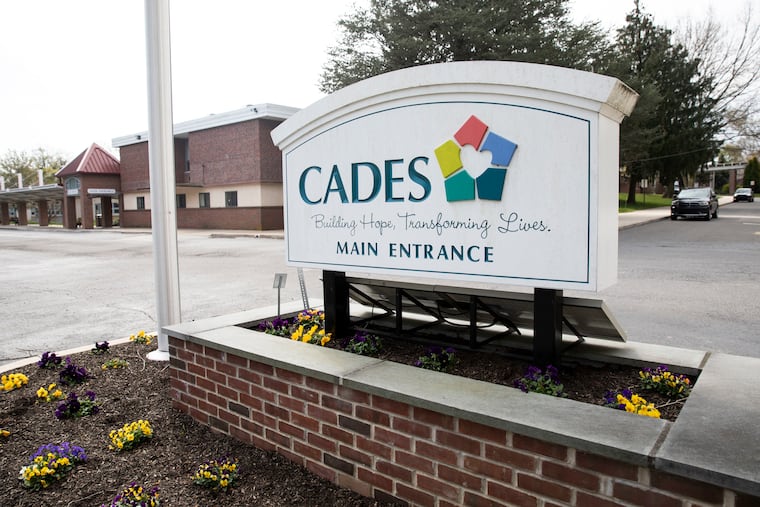Swarthmore group home settles with borough, will use ex-school to isolate COVID-19-positive residents
The borough says CADES is using a facility for medical purposes that isn't zoned for such reasons. But the group home says it's simply using the space to quarantine COVID-19 positive patients.

A Delaware County group home will continue to use a former school in Swarthmore to isolate residents who have tested positive for the coronavirus after settling with the borough, which last week sued the organization over the use of the building.
Children and Adult Disability and Educational Services (CADES), which is based in the borough and operates 33 residential group homes in Delaware, Bucks, and Chester Counties, resolved the dispute over the weekend, according to a joint statement.
“The parties agree that CADES has implemented responsible safety protocols which will remain in place to minimize any risks to CADES residents and employees, as well as Borough first responders and residents,” the statement read.
On Tuesday, Swarthmore filed a complaint against CADES, two days after it notified Swarthmore Borough officials that it had moved a handful of COVID-19-positive patients into a former school on its property.
CADES says it started using the former elementary school at 401 Rutgers Ave. days earlier to isolate residents who tested positive for COVID-19 but would not be admitted to a hospital or were already discharged. The goal, CEO Julie Alleman said in a statement, is to return the people to their group home at the conclusion of a quarantine period.
As of Friday, there were six COVID-19 positive clients in the building, a spokesperson said. At the time, 13 CADES residents and 10 staff members have tested positive.
The borough said it believes CADES could house “as few as 20 and as many as 50” COVID-19 positive residents in the space, typically used by the organization for educational activities and adult day care, which are both suspended during the pandemic.
In its complaint, the borough argued that the former school is being used as a medical and residential facility, for which it is not zoned. Mayor Marty Spiegel declined to comment.
Alleman said the temporary housing didn’t violate the borough’s zoning ordinance or endanger the community.
“This was done in order to continue to provide the care, staffing levels, and services these individuals need and deserve,” Alleman said, “all while minimizing the risks of exposing others.”
Group homes and long-term care centers in Pennsylvania are having to manage the spread of the virus in their facilities, which often house the elderly or people with underlying conditions — populations at a high risk of contracting and becoming ill from the virus — in tight quarters.
Many are facing severe staffing challenges. Last week, a Montgomery County nursing home evacuated more than 30 residents to the Lehigh Valley after dozens of staffers called out sick.
The coronavirus has spread rapidly through such facilities nationwide. About half of the coronavirus-related deaths in Pennsylvania have been residents of them. According to the Department of Health, there have been more than 3,500 positive cases of COVID-19 and 365 deaths across more than 300 nursing and personal-care homes.
About 300 of those cases are in Delaware County, in 34 locations. Delaware County Council member Christine A. Reuther said the situation with CADES has prompted a discussion among county officials about how to more proactively support long-term care facilities facing challenges with staffing levels and vulnerable residents.
She said the county was concerned that the litigation could distract CADES, a 60-year-old nonprofit, from caring for its medically fragile population, and worries that it’s spreading fear that housing COVID-19 patients in Swarthmore increased the risk in that community. She said that was not the case.
“We don’t need to be afraid. We need to be prepared,” Reuther said. “I applaud CADES for being proactive in both isolating their COVID-positive patients and maximizing their ability to staff their population.”
» HELP US REPORT: Are you a health care worker, medical provider, government worker, patient, frontline worker or other expert? We want to hear from you.
CADES and long-term care facilities in Delaware County, which does not have a health department, are regulated by the state.
State Department of Health spokesperson Nate Wardle said facilities are “encouraged to cohort patients, if needed, to assist in treatment.”
The coronavirus was detected among CADES staff as early as March 23, when Alleman wrote in a letter to families that a member of the organization’s senior leadership team had tested positive and was self-quarantining.
Alleman also wrote in that letter that the organization was working to implement stronger safeguards for residents and staff, including temperature screenings and disinfection plans.